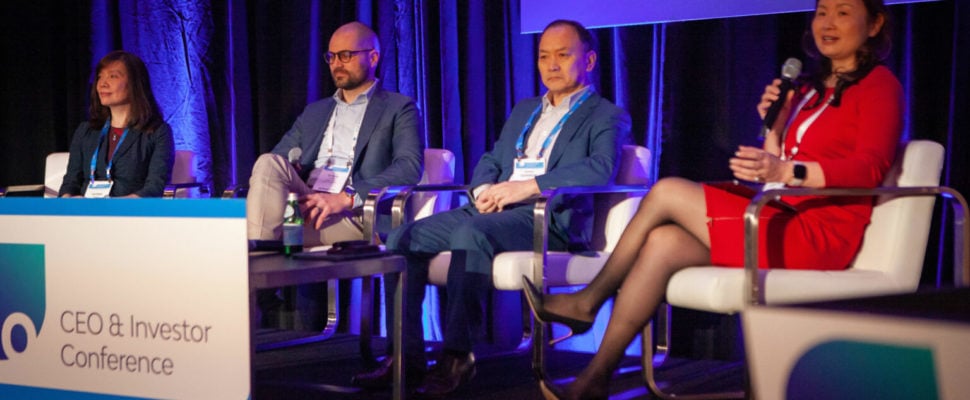In light of ongoing geopolitical tension, a globally unfavourable macroeconomic environment and new drug-pricing legislation in the US, at the recent BIO CEO and Investor Conference industry stakeholders evaluated the risks and the opportunities for cross-border deal-making between US and China and found a number of reasons to be optimistic.
Despite challenges such as the recent efforts to limit Chinese investment in the US through the Committee on Foreign Investment in the United States (CFIUS) and China moving for restrictions in retaliation, deals between American and Chinese biopharma companies continue to prosper. Chinese biotechs, according to GBI-Healthcare, entered into 46 out-licensing deals and 160 in-licensing deals with US or EU biopharma companies between January 2020 and May 2022. Participants in the BIO conference session, Recalculating Risk vs. Opportunity in China Deal-Making were optimistic about overcoming challenges to continue building partnerships, agreeing that the opportunities outweigh the risks.
A Market that has Evolved
In the last few years there has been a boom of very high-quality assets and companies that are emerging from China
Steve Ladd, AbbVie
When discussing the potential of China, Darren Ji, co-founder, chairman, and CEO of Elpiscience Biopharma, a biotech focused on immunotherapies for cancer, was quick to point out China’s evolution in the past few years. “We used to call China an emerging market. We can’t call it that anymore,” he said. “The last one to two years have seen China going from a country of such low scarcity of everything to a country with an abundance of capital,” Ji confirmed.
The country’s growth has been favourable for Chinese innovation. “In the last few years there has been a boom of very high-quality assets and companies that are emerging from China. The ecosystem as a whole has created an environment for growth, not only of assets that could be developed within mainland China and across Asia but are significant and can have a global impact as well,” said Steve Ladd, AbbVie’s director of business development and acquisitions.
AbbVie is well aware of the quality of Chinese assets, having made two significant deals with Chinese companies, I-Mab, for an anti-CD47 monoclonal antibody for the treatment of multiple cancers, and Jacobio Pharmaceuticals for its SHP2 inhibitors. “We’re starting to see a lot of assets that are making it through the development funnel. Which speaks of the quality of the assets being developed in China,” he continued.
The Impact of the Current Environment
The world is changing and no one knows when the IPO markets will come back
Darren Ji, Elpiscience Biopharma
Speakers did not feel that the current geopolitical tensions between the US and China were affecting the assessment of opportunities. “I don’t think that there is anything that has fundamentally shifted away from assessing opportunities in China,” said Ladd. “We are agnostic about where opportunities come from.” AbbVie has, however, changed its strategy, Ladd claimed, and this has had an impact on dealmaking: “For us there has been a shift in strategy. The types of assets we’re looking at based on the needs of our pipeline which may have led to some geographic shifts with respect to deals being done.”
Of the tension between the two countries over trade restrictions, Ji said, “it is concerning,” but concluded: “I do not think it is sustainable although it may have a temporary impact.” About current macroeconomic uncertainty, another factor impacting biopharma deals, Ji said: “The world is changing and no one knows when the IPO markets will come back.” To confront this uncertainty, Ji stated that biotechs are going back to fundamentals. “Innovation, pipeline, differentiation, and then we can look for partners to work together, but the quality of assets and the quality of execution are key,” he proclaimed.
Making the Cross-Border Connection
A lot of companies trying to go to the global market experience challenges
Yaping Shou, Wells Therapeutics & Lilly Asia Ventures
Although there may be deals to be made, it is not always easy for Chinese companies to gain access to biopharma companies in the US to showcase their assets. “A lot of companies trying to go to the global market experience challenges,” said Yaping Shou, CEO of Wells Therapeutics and venture partner at Lilly Asia Ventures, a firm that seeks Chinese assets for the in-licensing of external development. She helps these companies generate early clinical development data in the US to attract the interest of large American pharma companies.
When asked what kind of opportunities big pharma is looking for in China, Ladd said: “What we look for are not me-too drugs, but either first-in-class or best-in-class opportunities that can compete both internationally, as well as here in the United States.” “When we think about creating value and creative partnerships, its about maximising the value of assets … it is not just about the technical data or the clinical path, but it is about the future and thinking a few steps ahead,” he continued.
Ladd also mentioned the US’s new Inflation Reduction Act (IRA) and the overreaching impact it has on decision-making and predicted that in the near future deals will happen at earlier stages of development. “I think we will see a shift not only in the China biotech landscape, but in biotech as a whole where partnering occurs earlier,” he stated.
Rising above Politics
All of the participants agreed that any political strain on relations has to be set aside for the greater good of bringing new treatments forward for patients. “As we try to think through and navigate politics, rising above cross-border issues is fundamental because healthcare is a world problem,” said Ladd.
“COVID taught us that diseases do not confine themselves to one country,” Ji argued. “It is the same with every disease, from COVID to cancer. So, I am cautiously optimistic that people will remember that and keep that in mind for future collaborations.”



